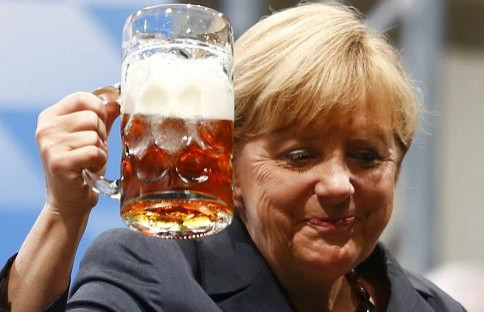How Will The German Election Affect Europe? Spain, Greece React To Merkel Third Term Win

Angela Merkel's convincing re-election to a third term as Germany's chancellor is the dominant news story across Europe Sunday, as Germany is the chief economic engine and banker for the continent.
Countries across the European Union's southern tier from Portugal to Cyprus had a vested interest in the election because of Merkel's heavily promoted austerity agenda, which has meant painful reforms and budget cuts in nations still reeling from the economic crisis. While many Mediterraneans may regret Merkel's continued leadership, some analysts still believe her third term will still see slow changes.
"Italians cannot make themselves a lot of illusions because there will not be radical changes in the European policy of Germany, whatever the outcome of this election will be," Paolo Valentino, a senior foreign policy columnist and former Berlin correspondent et Corriere della Sera in Milan, said in a Xinhua report. "I don't agree with the idea that Germany wants to have a hegemonic role. On the contrary it has been very shy in taking its responsibilities in Europe."
Reactions are not uniform across the euro zone, however. In Greece, where the economic situation remains dire, frustrations ahead of the election over Merkel's austerity plans were common. Germany's pre-election debates hinged heavily on dealing with Greece's economic crisis, and many Greeks are expecting the election result to weigh heavily on their nation. According to a recent editorial in the Greek daily To Vima, most Greeks would have preferred Social Democratic candidate Peer Steinbrueck, whose party lost Sunday.
"The election campaign in Germany, and the debate between Merkel and Steinbrueck in particular, might not have enlightened us regarding the intentions of the new government, whichever that may be," the publication wrote, ahead of the results. Support for Steinbrueck in Greece comes from the candidate's argument that "the lethal dose of the austerity medicine" was the wrong way to handle Greece's economic woes, and instead suggested that the economy be supported until it regains its footing and a competitive momentum.
Though Merkel laid down a hard line on budget cuts during election debates, others believe her priorities will take on a more cooperative direction after the fact. "I think we will see a different Mrs. Merkel after the elections," Cypriot President Nicos Anastasiades said in a statement, a view that is shared by most of the other European leaders concerned.
While France's President Francois Hollande rushed to congratulate the German leader and invite her to Paris, no official statements from below the "Olive Line" have been made.
© Copyright IBTimes 2025. All rights reserved.






















